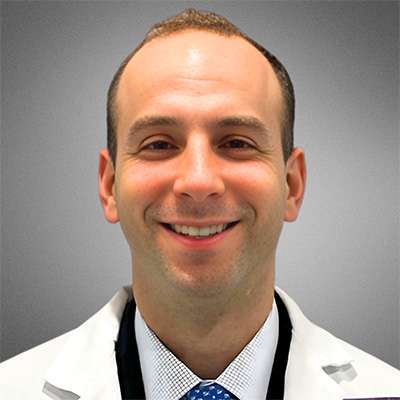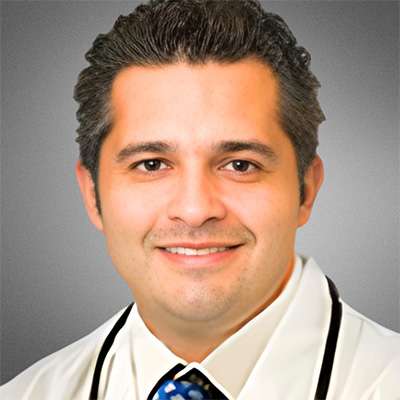What Is Abdominal Pain (Stomach Pain)?
If you’re suffering from abdominal pain in Manhattan or one of the other boroughs, it can be a mild inconvenience treatable with over-the-counter remedies or a sign of a severe illness that requires immediate attention from a gastroenterologist.
Abdominal pain should always be evaluated with a thorough consultation and examination by a gastroenterologist for an accurate diagnosis and treatment plan, as it may be a symptom of a severe illness or condition. There are multiple causes of stomach pain that should be investigated by a top GI specialist. Abdominal pain can be acute or chronic, and it can result from problems with the stomach, appendix, gallbladder, spleen, bowel, liver, or gynecological issues.
Therefore, it is critical that you see our practice’s stomach doctor for an examination and further investigation to determine the source of your pain. If you’re experiencing abdominal pain in the Upper East Side, your problem deserves to be addressed by a best-in-class stomach pain doctor.
”
★ ★ ★ ★ ★I came in for a consultation for an issue I’ve been having with my stomach for about 2 months. Dr. Yakubov was very kind, informative and made me feel at ease about my current situation. He really took his time to explain to me what the issue could be and answered all of my questions and concerns. The office is very beautiful and clean as well.
Find Out More: Abdominal Pain & When to Consult Your Gastroenterology Doctor
What Are the Causes of Abdominal Pain?
There are numerous causes of abdominal pain. The list is extensive, and it contains, among other things, the following:
- Bile duct inflammation (cholangitis)
- Bladder, kidney, or spleen infection
- Colon cancer
- Constipation
- Crohn’s disease
- Excessive gas and bloating
- Food allergies
- Food or lead poisoning
- Gallbladder inflammation
- Gallstones
- Gastroesophageal reflux disease (GERD)
- Gluten intolerance (Celiac disease)
- Heightened ketone levels (diabetic ketoacidosis)
- Hernia
- Indigestion
- Inflammation of the abdominal lining (peritonitis)
- Inflammation of the appendix (appendicitis)
- Inflammation of the pancreas (pancreatitis)
- Inflammation of the small intestine (duodenitis)
- Inflammatory bowel disease (ulcerative colitis)
- Intestinal obstruction
- Intra-abdominal malignancies
- Irritable bowel syndrome
- Kidney disease (uremia)
- Kidney stones
- Lactose intolerance
- Large intestine inflammation (diverticulitis)
- Less blood to the intestines (mesenteric ischemia)
- Liver disease (hepatitis)
- Lymphatic cancer (non-Hodgkin’s lymphoma)
- Pneumonia
- Ruptured spleen
- Sickle cell anemia
- Stomach lining inflammation (gastritis)
- Stomach virus or flu
- Strained, pulled, or injured abdominal muscle
- Swollen lymph nodes (mesenteric lymphadenitis)
- Torn or punctured colon
- Ulcer(s)
- Urinary tract infection
- Many other conditions
Women must add the following potential causes to their list:
- Fallopian tube inflammation (salpingitis)
- A fertilized egg outside your uterus (ectopic pregnancy)
- Infection of your reproductive organs (pelvic disease)
- Menstrual cramps
- Ovarian cancer
- Ovarian cysts
- Ovulation pain (mittelschmerz)
- Tissue growing outside your uterus (endometriosis)
Review the article: Common Causes of Stomach Pain after Eating
What Are the Abdominal Pain Symptoms?
Symptoms associated with stomach might include:
- Belching
- Bloating
- Indigestion
- Constipation
- Diarrhea
- Heartburn
- Pelvic discomfort
- Discomfort in the upper right or left, middle, or lower right or left abdomen
Abdominal pain treatment depends on the patient’s history of the disease or other health conditions that cause it.
How to Diagnose Abdominal Pain?
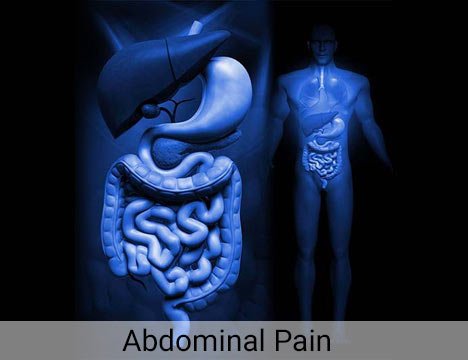
If your pain is localized, knowing where it is (high or low, left or right, front or back) can help your GI specialist narrow down the cause. The duration and intensity of your pain can also point your GI doctor in the right direction. Associated symptoms, such as diarrhea or fever, can potentially indicate a specific cause.
When you come to our offices for a consultation, our physicians will go through your medical history and symptoms before doing a thorough examination. Blood, urine, and/or stool tests may be ordered by your GI doctor if necessary. As part of the evaluation, our abdominal pain doctors may request imaging or endoscopy, colonoscopy, small bowel capsule, or other medical diagnostic procedures. The first step toward abdominal pain alleviation is determining the correct diagnosis.
How to Treat Abdominal Pain?
Frequently Asked Questions
What Are the Different Types of Stomach Pain?
We can divide abdominal pain into three categories:
- Localized. Pain is limited to a single area of the abdomen and is usually caused by problems with a specific organ. Stomach ulcers are the most common cause of this type of pain.
- Cramp-like. This type of pain is linked to constipation, diarrhea, bloating, or flatulence. It can develop in women as a result of miscarriage, menstruation, or complications in the female reproductive organs. This type of pain comes and goes and may disappear completely without treatment.
- Colicky pain. This ache is a sign of a more serious condition, such as kidney stones or gallstones. It happens suddenly and may feel like an acute muscle spasm.
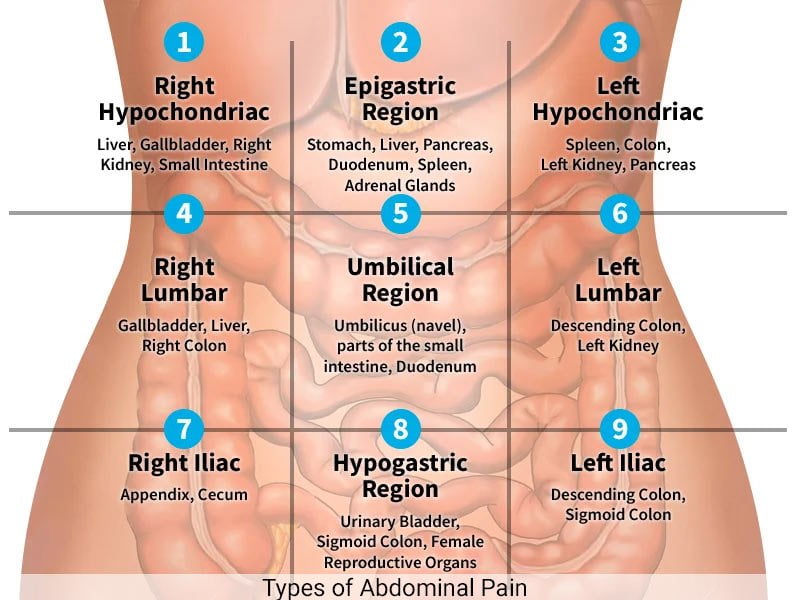
Are There Ways To Prevent Abdominal Ache?
There is no way to prevent all types of abdominal pain. However, it is possible to reduce the chance of being exposed to this type of pain.
Abdominal pain prevention should start with the following:
- Drink plenty of water
- Maintain a healthy diet
- Eat smaller meals
- Exercise on a regular basis
It is also not recommended to lie down straight after your meal because it may cause abdominal pain along with heartburn. In general, you should not lie down for at least two hours after eating.
How to Describe Stomach Pain to Doctor?
When to See a Doctor for Stomach Pain?
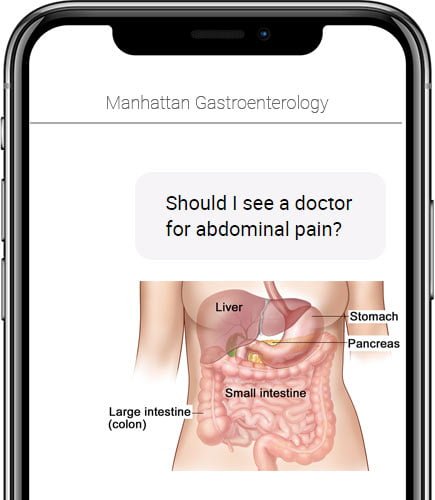
Mild pain can disappear on its own without treatment. However, if your abdomen pain is severe and the result of an injury, or pressure in your chest, you should consult a stomach doctor.
Immediate medical assistance is required if your ache is so severe that you cannot sit or if you experience any of the following:
- Higher fever
- Persistent vomiting or nausea
- Bloody stool
- Yellowing of the eyes or skin
- Difficulties with breathing
- Serious tenderness of the abdomen or swelling
What Can You Do to Reduce Abdominal Pain?
Abdominal pain usually goes away on its own before medical attention is required.
There are certain self-care measures you can try to alleviate your symptoms while you wait for them to subside, such as:
- Apply heat to your abdomen using a hot water bottle, a heating pad, or warming cream
- Stay hydrated by drinking plenty of fluids
- Reduce your intake of solid foods in favor of more bland foods such as bananas, crackers, and applesauce
- Calm your mind and get plenty of rest
- Avoid beverages that can worsen your symptoms, such as tea, coffee, and alcohol
- Take a hot bath to relax the stomach area
- Try over-the-counter antacids and mild painkillers like paracetamol
- Avoid NSAIDs unless advised by your doctor
If you suffer from abdominal pain on a regular basis, see a gastroenterologist to determine the exact cause and take the necessary steps to make you feel better.
Explore the article: Stomach Pain After Eating? Here Are 7 Things It Could Be
Important Reminder: The only intent of this information is to provide guidance, not definitive medical advice. Please consult a GI doctor about your specific condition. Only trained gastroenterologists can determine an accurate diagnosis and proper treatment.
As leading stomach pain doctors in NYC, our team at Manhattan Gastroenterology offers highly personalized and comprehensive care. Our expert abdominal pain specialists are dedicated to diagnosing and treating a wide range of gastrointestinal issues with personalized care and attention. They have earned some of the most respected reputations in NYC. For more information about the GI conditions we treat or to schedule a consultation with one of our specialists, please contact our offices.






